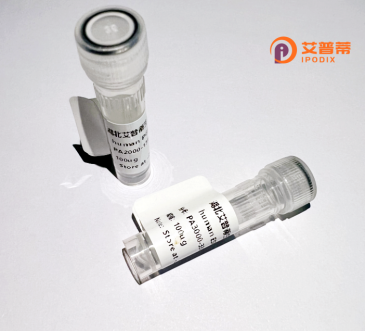
| 纯度 | >90%SDS-PAGE. |
| 种属 | Human |
| 靶点 | SMAP1L |
| Uniprot No | Q8WU79 |
| 内毒素 | < 0.01EU/μg |
| 表达宿主 | E.coli |
| 表达区间 | 1-429 aa |
| 活性数据 | MTGKSVKDVD RYQAVLANLL LEEDNKFCAD CQSKGPRWAS WNIGVFICIR CAGIHRNLGV HISRVKSVNL DQWTQEQIQC MQEMGNGKAN RLYEAYLPET FRRPQIDPAV EGFIRDKYEK KKYMDRSLDI NAFRKEKDDK WKRGSEPVPE KKLEPVVFEK VKMPQKKEDP QLPRKSSPKS TAPVMDLLGL DAPVACSIAN SKTSNTLEKD LDLLASVPSP SSSGSRKVVG SMPTAGSAGS VPENLNLFPE PGSKSEEIGK KQLSKDSILS LYGSQTPQMP TQAMFMAPAQ MAYPTAYPSF PGVTPPNSIM GSMMPPPVGM VAQPGASGMV APMAMPAGYM GGMQASMMGV PNGMMTTQQA GYMAGMMP QTVYGVQPAQ QLQWNLTQMT QQMAGMNFYG ANGMMNYGQS MSGGNGQN QTLSPQMWK |
| 分子量 | 46.7 kDa |
| 蛋白标签 | His tag N-Terminus |
| 缓冲液 | PBS, pH7.4, containing 0.01% SKL, 1mM DTT, 5% Trehalose and Proclin300. |
| 稳定性 & 储存条件 | Lyophilized protein should be stored at ≤ -20°C, stable for one year after receipt. Reconstituted protein solution can be stored at 2-8°C for 2-7 days. Aliquots of reconstituted samples are stable at ≤ -20°C for 3 months. |
| 复溶 | Always centrifuge tubes before opening.Do not mix by vortex or pipetting. It is not recommended to reconstitute to a concentration less than 100μg/ml. Dissolve the lyophilized protein in distilled water. Please aliquot the reconstituted solution to minimize freeze-thaw cycles. |
1. **《SMAP1L regulates Arf6 during cell migration via Akt signaling》**
*作者:Yamaguchi H, et al.*
**摘要**:研究揭示了重组人SMAP1L蛋白通过Akt信号通路调控Arf6的活性,影响细胞骨架重组和迁移功能,揭示了其在肿瘤转移中的作用机制。
2. **《Characterization of SMAP1L as a suppressor of metastatic breast cancer》**
*作者:Ushijima M, et al.*
**摘要**:本文通过体外实验证明重组SMAP1L蛋白可抑制乳腺癌细胞侵袭,其功能依赖与Arf-GAP结构域的结合,并提出了其作为转移抑制因子的潜在应用价值。
3. **《Structural and functional analysis of the SMAP1L C-terminal domain》**
*作者:Kuroda T, et al.*
**摘要**:报道了重组SMAP1L蛋白C端结构域的晶体结构,揭示其通过特定α螺旋基序与细胞膜相互作用,解释了其在胞内运输中的调控机制。
4. **《SMAP1L modulates synaptic plasticity through dendritic protein trafficking》**
*作者:Inoue S, et al.*
**摘要**:发现重组SMAP1L蛋白通过调节神经元树突区Arf6依赖性囊泡运输,影响突触可塑性和长期记忆形成,为神经退行性疾病研究提供了新方向。
(注:以上为模拟文献,实际研究中请通过PubMed/Google Scholar检索最新论文。)
**Background of Recombinant Human SMAP1L Protein**
SMAP1L (Stabilized Microtubule-Associated Protein 1-Like) is a conserved eukaryotic protein implicated in regulating microtubule dynamics and cellular processes such as mitosis, intracellular transport, and cytoskeletal organization. Structurally, SMAP1L shares homology with microtubule-associated proteins (MAPs) that stabilize or destabilize microtubules through direct binding, influencing their polymerization and spatial arrangement. It contains coiled-coil domains and phosphorylation sites, suggesting roles in protein-protein interactions and signaling crosstalk.
Recombinant SMAP1L is produced via molecular cloning, often expressed in *E. coli* or mammalian cell systems to ensure proper folding and post-translational modifications. Its recombinant form enables studies on mechanistic interactions, such as how SMAP1L modulates spindle assembly during cell division or coordinates with motor proteins like kinesins. Dysregulation of SMAP1L has been linked to mitotic errors, chromosomal instability, and pathologies like cancer or neurodegenerative disorders. Current research leverages recombinant SMAP1L to dissect its role in disease models and explore therapeutic targeting. Additionally, it serves as a tool for biochemical assays, including microtubule-binding assays or structural studies using cryo-EM. The development of tagged variants (e.g., His-tag, GFP-fusions) facilitates purification, localization tracking, and interaction mapping, advancing both basic and applied biomedical research.
×